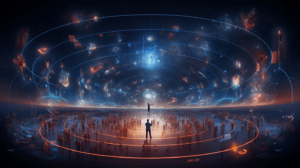AI as an Irreplaceable Scientific Partner
Artificial intelligence is rapidly becoming an indispensable tool for researchers across scientific disciplines. As massive datasets and model complexity continue growing exponentially, AI is enabling scientists to analyze, simulate, and understand multifaceted systems in unprecedented ways.
Recent years have seen remarkable AI-driven advances in fields like biomedicine, quantum physics, materials science, and astronomy. For instance, deep learning systems can now predict complex protein structures and identify promising new drug compounds by screening millions of candidates. AI simulation models are also making once intractable nuclear fusion experiments computationally feasible.
In materials science, algorithms can effectively navigate vast chemical search spaces to discover novel compounds for solar cells, batteries, and electronics. AI is even helping physicists analyze enormous volumes of data from particle colliders to uncover signals of exotic subatomic phenomena.
Democratizing Discovery
A key driver of this proliferation is the democratization of AI tools, which allow non-specialists to harness these powerful techniques. User-friendly software from companies like DeepMind and frameworks like TensorFlow enable scientists with no computer science background to implement AI. This makes AI’s capabilities accessible to domain experts.
Open-source algorithms like AlphaFold and GPT also permit researchers to leverage state-of-the-art models at zero cost. By reducing barriers to entry, such democratization expands AI’s scientific applications exponentially.
Accelerating the Process
Beyond analyzing results, AI is also accelerating the scientific process itself. Automation allows robotic systems to conduct certain well-defined experiments around the clock, vastly improving productivity.
Meanwhile, active learning techniques optimize the variables and conditions for experiments, reducing costs. Algorithms can also synthesize disparate findings into unified theoretical frameworks faster than humans, driving progress.
And generative AI models like DALL-E permit the creation of simulated datasets for domains where real data is scarce. This provides new opportunities to train predictive models.
Collaborative Discovery
By enabling real-time collaboration in shared virtual environments, AI also facilitates unprecedented global teamwork between researchers. Scientists worldwide can collectively design simulations and analyze complex datasets in these digital workspaces.
And using techniques like federated learning, data can be analyzed across institutions without compromising privacy. Such advances promote collaborative discovery beyond institutional and geographic barriers.
Augmenting Human Ingenuity
Therefore, the greatest potential lies in humans and AI working together in a hybrid partnership. As AI handles routine tasks like data processing, scientists can devote more time to imaginative theorizing and experimentation. This symbiosis amplifies their capabilities.
An Ethical Imperative
But for its full potential to be realized responsibly, the development of scientific AI necessitates addressing ethical challenges around issues like bias, transparency, and access.
Regulations are needed to ensure AI systems don’t inadvertently propagate prejudices and that their reasoning is scrutable. Democratizing access to AI capabilities for researchers worldwide also remains important for equitable progress.
Conclusion
By navigating these challenges, AI can become an unprecedented powerhouse fueling discovery. Like the microscope and telescope before it, this new instrument in the scientific toolkit may propel breakthroughs at an extraordinary pace. But it is only one half of the equation – the other being human creativity, which AI can augment but not replace.

